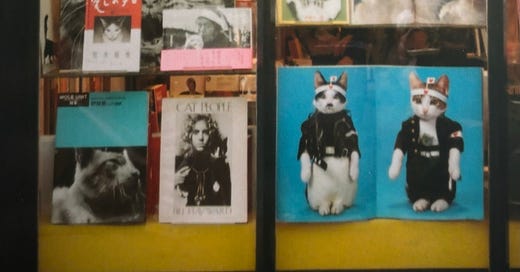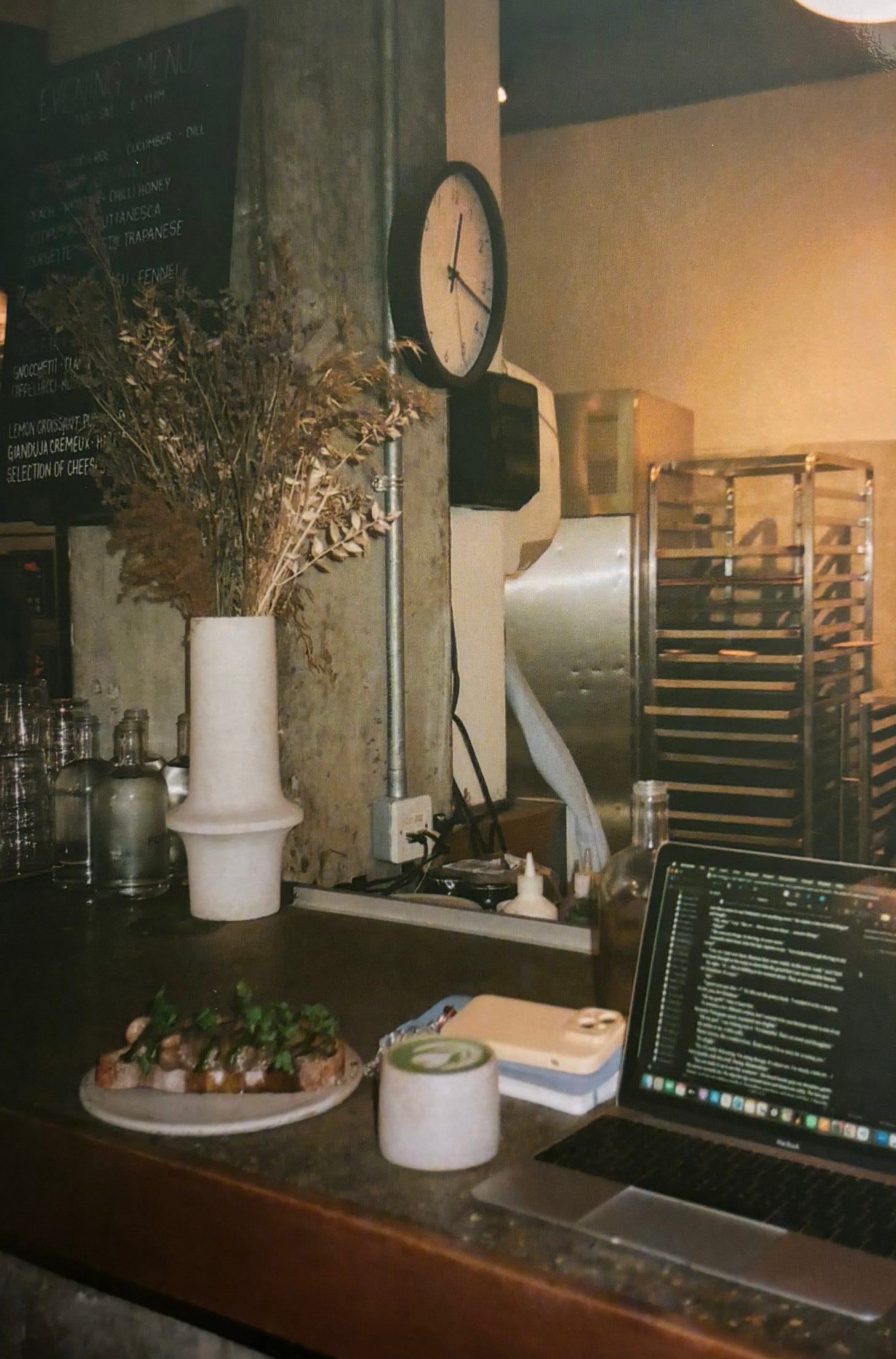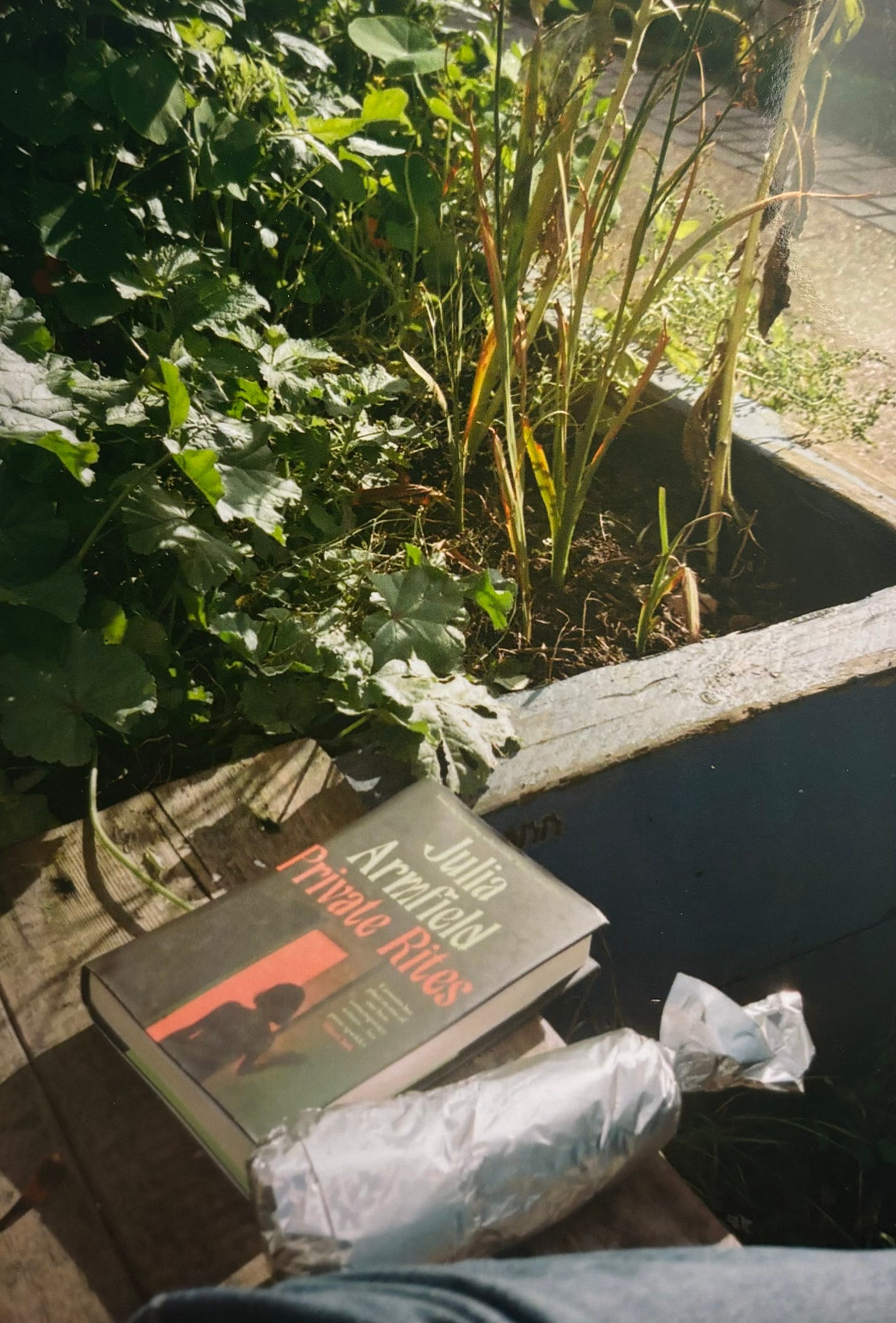I’m trying to make a move away from social media. In doing so, I noticed that social media also included my phone. Both were engineered to addict me. Both superficially connected me to community and friends, giving me the exhaustion of having socialised without the same buzz I got from IRL interactions. Both turned my data into profit, which was spent it in ways that diverged from my values and even undermined them.
Both were similarly dissatisfying as a user experience. I realised, if I picked up my phone to do something useful (like finding my friend’s address to send her a card after her mother passed away), I ended up doing three useless things, getting frustrated, and locking the phone screen without having done the thing I intended to do (yes, I had to open the phone three times for the address).
In January, I decided to make a rule: Put down phone, pick up…. journal
That month, when I wanted to reach for my phone, instead I reached for my new journal, a blank book with thick, recycled paper, and no lines. It turned out, I picked up my journal quite frequently, and definitely at night. I tried to go with it, and fill the blank pages with whatever I felt like. I made a collage of photographs of my loved ones. I wrote to my children. I wrote about my days. I stuck stickers and tracked my exercise and listed podcasts I was listening to and made collages of my priorities. I wrote in quotations from poets and writers. I commented to myself about things.
I started to discover that I had been living in a weird way. Why was I recommending things to strangers on the internet like some kind of “socialising in London” expert? Why was I sharing news to stories like I was a stand-in for The Guardian? Why did I take pictures of where I was, when I’ve always thought location-sharing was nothing more than a cynical and irresponsible move by social platforms to gain ad money?
And as January ticked by, I could feel my nervous system reacting to the change. I was winding down. I started to be comfortable with doing nothing much of an evening. I started to think different thoughts. Thoughts like, “everything can be done in time, and if you can’t do it without getting tired and feeling bad, then you can’t do it,” and, “So what if this project takes 6 weeks instead of 3?”, “So what if this application is in first week of March instead of last week in January?” I felt calmer and I had journaled about my priorities — and so I knew that work, although meaningful to me, didn’t make first or second place on the list. Maybe not even third. (* “Pray tell, behind what?” you say? See the bottom of this article…)
In this episode of the podcast Offline, co-host Max interviewed Dr. Gloria Mark, author of Attention Span. They talked about task-switching, which is switching between several different things. This, from Gloria, surprised me: human beings can’t multitask unless one of the tasks is automatic. Gloria gave the example of walking and texting — walking is automatic, so it’s possible to text while one does it, but come to an intersection where it’s necessary to scan the road for cars, and we have to stop texting to do it.
It’s not actually possible to focus on two non-automatic tasks, so we shift attention quickly between things, like writing + emailing + a notification coming in + looking up something online. This is task-switching and, along with pulling our attention back from distractions, it’s very draining. Attention is a finite cognitive resource, and when that resource is drained or depleted, we become very stressed. We have limited cognitive resources daily, and we drain them throughout the day — until we’re tired, and we go to sleep. Grief, additionally, like worry over health and money and our loved ones, is a background task that depletes cognitive resources throughout the day.
Task-switching doesn’t just tax your attention in the moment, something in Gloria’s book that Max draws the listeners attention to. If we task-switch, we feel the consequences all day, even when we aren’t task-switching. We become exhausted, stressed, and when that happens daily, our stress gets to the point of burn out.
By journaling instead of using my phone, I was doing less task-switching. When I had the urge to pick up my phone during the day, I couldn’t journal because I was working — but I didn’t pick up the phone. During the evening, I picked up my journal, and focused for a much longer period of time than I would on my phone. Sometimes I put on a show while I collaged and then, if I was writing, I’d pause it — but I did this naturally, as my focus had already shifted. I usually left the show off, and went to bed after I had finished writing, as journaling helped me to wind down and feel calm, sweet, and restful. It was shee fuhk sai for my brain, as my Cantonese family says — that clean and cosy feeling.
As the month went on, I started to feel less depleted. It was easier to focus on what I wanted to do. Another positive change was that when I was tired or sad or in need of rest, I felt I could hear my body more and was more able to pay attention to the way I was feeling — something that I’ve learned from therapy is vital to our happiness, our ability to have some power and agency in our lives, and, as a knock on effect, our ability to feel hope, which is something I struggle with in grieving. In being more in tune with my feelings, I could respond to them. If I was tired, I should sleep, so I did.
In early February, I had a new work contract, and several other irons in the fire, and had to be on my phone a lot. The reason for this — although the new job is one I enjoy and am very interested in — was mainly money. I had also returned to a dating app. This, more than my other phone use in early February, sent my head into a spin.
By that time, I had successfully been spending much less time on Instagram and was not “checking” it — and therefore not doing the “checking loop” of email—Instagram—Whatsapp (I don’t have notifications that come to my screen). Having only email and messaging, I checked my email during work hours and Whatsapp in breaks. Using a messaging service had started to feel nice, actually. The benefit of not perusing all the many posts not intended specifically for me on Instagram was that I had time in the evenings to text chat with my local friends, and so felt closer to them and we had arranged some IRL activities together.
When I signed back up to a dating app, however, I was now purposefully using an app with an algorithm — which was in turn using me, for my cash! The algorithm meant I could be on there for hours. This only happened a few times, but it made me feel so wired in the other hours of my day. It was like something I had to constantly remember — have I checked the app today? I don’t want to “miss” someone! Have I liked enough people to make matches? Is my profile representative of who I am without baring my soul??
Between the dating app and the increase in workload, my head started to hurt again. I forgot to do my physio-recommended exercises almost every day, so a leg injury I have worsened. I felt ill after a long period of seeming immune to every cold. Things seemed to be spiralling out of control, and my priorities moved further and further away from me, stacked behind tasks that took longer to complete.
I remind myself: am I spending my time meaningfully? Are my actions in line with my values? Do I have any power here to do something about this?
I delete TikTok. I pick up my journal again to write a short entry and find myself penning a long one. I get inspired to write this essay. I return to my lists of priorities and renegotiate my schedule. I give up a little. I say, “that can’t be done tonight”. I say, “you’re tired. stop working.” I say, “it’s good enough. You do enough.”
Take a look at my recharged Substack:
it has a new title,
new sections on Baby Loss, (you have to sign up to this if you’d like to receive them. To do so, click here, and then on “Manage Subscription”)
and Journaling,
and pages with info on my novels,
and development editing and mentoring.
Imbibing, currently:
snatches of Pleasure Beach by Helen Palmer,
Haim while out walking; specifically, ‘Summer Girl’,
for the billionth time, NBC’s Parenthood, now on Netflix,
and slowly getting used to organic hawthorn tea…
*Behind HUMAN RELATIONSHIPS!







Although I've become more selective in the social media and messaging I use, especially the apps installed on my phone, I have to admit they're still so integral to my everyday that the idea of not getting notifications just never even occured to me. Though without them I'm sure I'd get stuck in the "checking loop" of FOMO, too.... :s
Thank you so much for the realisation, definitely time to start finding other things to fill my time with.
Oooooh I love this! So tired of being a slave to the algorithms… you’ve inspired me to pick up my sketchbook today and turn my phone notifications off! I just needed the right nudge ☺️❤️